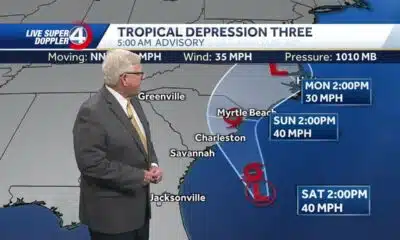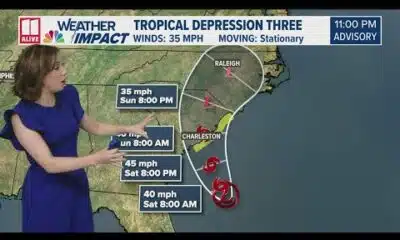News from the South - Arkansas News Feed
Addressing student misbehaviors: Educators need training to be proactive
Addressing student misbehaviors: Educators need training to be proactive
by Lydia Lucien Collins, Guest Commentary, Arkansas Advocate
March 21, 2025
Jackson starts the day in my 2nd grade class sitting criss-cross applesauce during carpet time and solving math story problems. He frequently ends the day by shoving chairs and screaming at his classmates.
It was while taking large balloon breaths to control his feelings that Jackson blurted out, “I’m angry!” He told me it was because his mom was in prison and he couldn’t see her. Until then, I hadn’t fully realized how much of Jackson’s outside life was finding its way into our classroom, affecting him and our entire learning community.
Student behavior problems are on the rise and are getting more serious. According to America’s Health Rankings, 52 percent of children in Arkansas have experienced one or more adverse childhood experiences (stressful or traumatic childhood events), higher than the national average of 39 percent. Jackson working through his mother’s incarceration is just one example.
To support Jackson, I researched strategies to help him regulate his emotions. When he became angry, we practiced “throwing fireballs,” acting like we were tossing things into the air very quickly. We found ways to name his feelings, and he became more and more comfortable asking me for a break when he needed time to reset.
He is feeling and learning better, but growth isn’t a linear process. There are still days when Jackson has emotional or behavioral outbursts, when I need to ask him, “What is another way you could’ve handled this?”
I’m not the only teacher in Arkansas who needs to help students manage their emotions and learn how to process their trauma in healthy ways. Educators in our state need training in trauma-informed care and practices.
If I had better preparation in topics such as deescalation of behaviors and self-regulation, I would have been able to help Jackson much sooner. If I had a toolkit of coping strategies for him to self-regulate and reset, I would’ve also been able to help him identify his emotional triggers.
Such training for educators should include student scenarios so that teachers can practice identifying root causes of behaviors like pushing furniture around the classroom. When I first saw this behavior in my classroom, I was unsure what led to it and how to handle it. I didn’t understand why Jackson was behaving the way he did; I was not proactively helping him to adjust to my classroom. It took me a while to understand that Jackson needed consistent expectations and clear boundaries, in addition to a calm, safe place to take a break.
The Arkansas LEARNS Act underscores the “importance of prioritizing school safety by focusing on physical security, additional resource officers, and mental health and training to implement best practices.” Who better than teachers — often the first touchpoint for a student — to receive this training?
The next step is to allocate funding to make this vital professional learning possible. The Arkansas Department of Education, for example, could offer grants, encouraging schools to apply for staff trauma-informed training specific to the needs of their students. The application could take into account the school safety report, which provides more insight into the school’s demographics.
Eligible criteria to receive funding could be based on the demonstrated percentage of students in the school impacted by adverse childhood experiences. In my school, students would particularly benefit from having teachers who were better trained in coping strategies. Behavioral outbursts frequently occur when students get upset and have difficulty calming down.
Jackson ended the year taking deep breaths and calmly asking me: “Mrs. Collins, is it okay if I take a break? I’m frustrated.” Self-regulation and naming his emotions are the skills that will help him succeed beyond my classroom. Let’s make sure that educators have the tools they need to give Arkansas students like Jackson the support they need to deal with any and all experiences life might throw at them.
Note: The student’s name has been changed to protect their privacy.
This article has been updated to show the correct author.
Arkansas Advocate is part of States Newsroom, a nonprofit news network supported by grants and a coalition of donors as a 501c(3) public charity. Arkansas Advocate maintains editorial independence. Contact Editor Sonny Albarado for questions: info@arkansasadvocate.com.
The post Addressing student misbehaviors: Educators need training to be proactive appeared first on arkansasadvocate.com
News from the South - Arkansas News Feed
Real-life Uncle Sam's descendants live in Arkansas
SUMMARY: Uncle Sam, the iconic personification of the U.S. government, was inspired by a real man named Sam Wilson, a meatpacker from Troy, New York, born in 1766. His barrels labeled “U.S.” led locals to joke it stood for “Uncle Sam,” birthing the legend. Helen Painter of Conway, Arkansas, is a direct descendant, a fact confirmed in 2015 through genealogy research by MyHeritage. Helen’s family now actively honors their ancestor, with Helen speaking at celebrations in Troy each Independence Day. She reflects on the enduring patriotism inspired by Sam Wilson, while her son, Troy, a nearly 30-year Navy veteran, proudly displays Uncle Sam imagery.
An Arkansas family is sharing their experiences as descendants of America’s mascot.
Subscribe to 40/29 on YouTube now for more: http://bit.ly/PTElbK
Get more Northwest Arkansas news: http://www.4029tv.com
Like us: http://facebook.com/4029news
Follow us: http://twitter.com/4029news
Instagram: https://www.instagram.com/4029news/
News from the South - Arkansas News Feed
President Trump to sign spending bill on 4th of July
SUMMARY: President Trump plans to sign the One Big Beautiful Bill Act on July 4th, following its passage by Congress in a 218-214 vote. The bill, described by Trump as a major victory, extends his 2017 tax cuts, increases the child tax credit, boosts border security, immigration enforcement, and defense spending, and eliminates taxes on tips and overtime pay. President Trump celebrated the win during a speech at the Iowa State Fair. House Speaker Mike Johnson praised Trump’s role in negotiations, while Democratic Leader Hakeem Jeffries condemned the bill for cutting social programs like SNAP and Medicaid. The Congressional Budget Office projects a $3 trillion deficit increase.
After months of intense debate on Capitol Hill, President Trump is planning to sign the “Big, Beautiful Bill,” which was passed by Congress yesterday.
News from the South - Arkansas News Feed
Could roundabouts become more common than red lights?
SUMMARY: Cities like Rogers and Bentonville are increasingly adopting roundabouts to manage growing traffic. Officials highlight that roundabouts are safer, reducing severe crashes by up to 82%, and more efficient, allowing slower but smoother traffic flow. Unlike traffic signals, roundabouts remain operational during power outages, as seen after last year’s tornado. Rogers has expanded from a few roundabouts to over two dozen in a decade. Despite safety benefits, some residents express concerns about property impacts and unfamiliarity with roundabout use. Public feedback on a proposed roundabout at a busy Benton County intersection is open until July 11, with more planned ahead.
Could roundabouts become more common than red lights?
Subscribe to 40/29 on YouTube now for more: http://bit.ly/PTElbK
Get more Northwest Arkansas news: http://www.4029tv.com
Like us: http://facebook.com/4029news
Follow us: http://twitter.com/4029news
Instagram: https://www.instagram.com/4029news/
-
The Center Square6 days ago
U.S. Senate prepares for passage of One Big Beautiful Bill Act | National
-
News from the South - Louisiana News Feed6 days ago
Water company hiked sewage rates in Lafayette to state’s highest
-
News from the South - Tennessee News Feed6 days ago
“Choose how you love:” Nashville Pride 2025
-
News from the South - Virginia News Feed7 days ago
Senate Republicans work through the weekend to pass Trump’s One Big Beautiful Bill
-
Mississippi Today5 days ago
Feds unfreeze $137 million in Mississippi education money
-
News from the South - Arkansas News Feed6 days ago
Thousands celebrate pride, progress at the 2025 NWA Pride Parade
-
News from the South - Arkansas News Feed6 days ago
Congress unlikely to enact ‘absolutely devastating’ Trump proposal to slash Pell Grants
-
Local News6 days ago
Mississippi airports working to complete projects





































